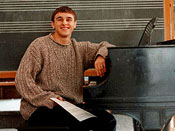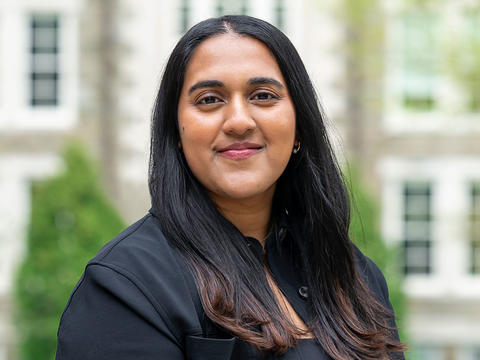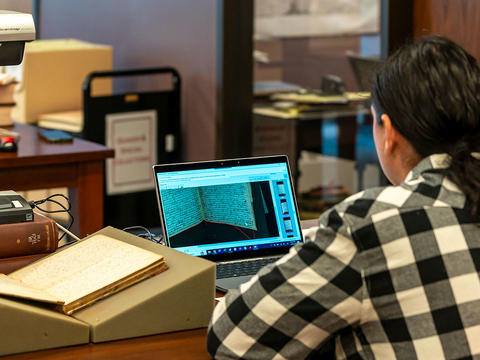Aspiring Haverford Doctors Find a New Prescription For Medical School Preparation

Details
Does illness sound different to a doctor who is just as familiar with listening to a piano as a stethoscope? Can the intense study of Aristotelian thought alter a doctor's decision on how to treat a terminally ill person? Can knowledge of the poems of Pablo Neruda translate the suffering of a patient to a doctor in a new way?
For the answers to these questions, you'll need to track the future careers of aspiring Haverford doctors like Jonathan Armour who, as a music major, spends many hours each week practicing and composing music for piano. Or Sara Greenhill, a Spanish major who spent part of her junior year in Barcelona immersed in Spanish language and culture. Or Sam Floyd, who, as a double major in philosophy and biology, is currently exploring the intricacies of Aristotelian thought in addition to his current research into the effects of anesthetics on cell membranes.
These three Haverford students are part of a small number of undergraduates who have chosen to pursue their dreams of becoming medical doctors not only in undergraduate chemistry and biology labs, but in less traditional places - such as in a college's music and art buildings, in its language lab, and its English and philosophy classrooms.
While the vast majority of college graduates applying to medical school continue to study a traditional "pre-med" curriculum based in the sciences, about 7 percent of these applicants nationwide major in non-scientific disciplines in addition to taking preparatory science courses. At Haverford, that number is relatively higher. Approximately 10 percent of Haverford students applying to medical school fit this non traditional category, said premedical advisor Jenette Wheeler.
"Haverford has always had a lot of students who have chosen to do this," she says. "You see them in almost every major. Haverford has always tried to encourage this for students who could handle it."
But Wheeler notes this approach is not for everyone. Students must maintain above average grades both in their major and in four required pre-med courses at Haverford - inorganic and organic chemistry, biology and physics - and also score well on the Medical School Admissions Test (MCAT). Some students also have waited until after their senior year to apply instead of after their junior year to give themselves extra time and courses to demonstrate their proficiency in the sciences. And, she notes, many Haverford students who have done this in the past find they must work a little harder in their first year of medical school than their peers.
"It isn't always the easiest way to get into school and it's not always the most successful," says Wheeler, noting medical schools admission officers say they are looking for more non-traditional students, yet the current admission statistics do not reflect that philosophy.
However Wheeler and the students who are opting for this approach believe the experience will make them unique doctors in the future.
"They're going to bring a more intellectual perspective to medicine and to their patients. They might be more well-rounded and have a different perspective other that the general pre-med graduate," she says.
Armour, Greenhill and Floyd hope their broader educations are an asset in the medical school application process, yet all three say their decision to take this approach was anchored in their own intellectual interests.
"I have the rest of my life to study medicine and science," explains Greenhill '98, who has always planned to attend medical school. "I figured I might as well study something different while I had the chance."
She says her Spanish major has demonstrated how a different language can mold culture and beliefs, and she believes she will better be able to treat patients who don't share the same culture or background as herself. Both of Greenhill's parents attended medical school, and she says they encouraged her to study something different as an undergraduate. They believed the broader experience would not only maker her a better doctor, but help her in the admission process, she explains.
For Armour, majoring in music was a natural choice, despite the fact he had always aced his science courses.
"Music has always been an important part of my life. I couldn't see myself studying strictly science for four years of college and four years of medical school. While at Haverford, I wanted to find a balance between music and pre-medicine," he explains. "I think I have gained just as much from music and the arts as I have from the sciences. There are different ways of thinking involved - different methods of approach."
But throughout his career at Haverford, Armour '98 has never lost sight of his dream of becoming a doctor, and he has made a point of gathering as much outside medical experience as possible. He has participated in four Haverford externships where he has shadowed a pediatrician, an otolaryngologist, an obstetrician/gynecologist and a neurologist. For two summers he also worked in an internship with an ear, nose and throat specialist.
Floyd, a third year student who juggles over five courses a semester for his double major in biology and philosophy, says he has wanted to be a doctor for as long as he can remember. He admits to mapping out T.V. Guides as a kid to find out whenever a medical program was slated for the "Discovery Channel."
But by his sophomore year at Haverford, he realized he wanted to delve into ways of thinking that weren't just based on scientific inquiry.
"Although I think scientifically, I really enjoy the humanities and the arts," Floyd explains. "I realized there was some aspect of science as it applies to medicine that was essentially humanistic, and I wanted to explore that."
Although Floyd says the academic cross-overs between his actual biology and philosophy classes are limited, he says they often come together when he thinks about his future medical career.
"In my mind medicine is an art form in the purest sense," Floyd explains. "To me, art is that which takes the ugly or mundane and, from it, crafts beauty or novelty. For humans, illness is the most visceral ugliness, the privation of that which is most precious to us: health. Insofar as medicine is capable of contributing to the process of building or re-building health from illness, it is essentially an art form - a process of beautification."



